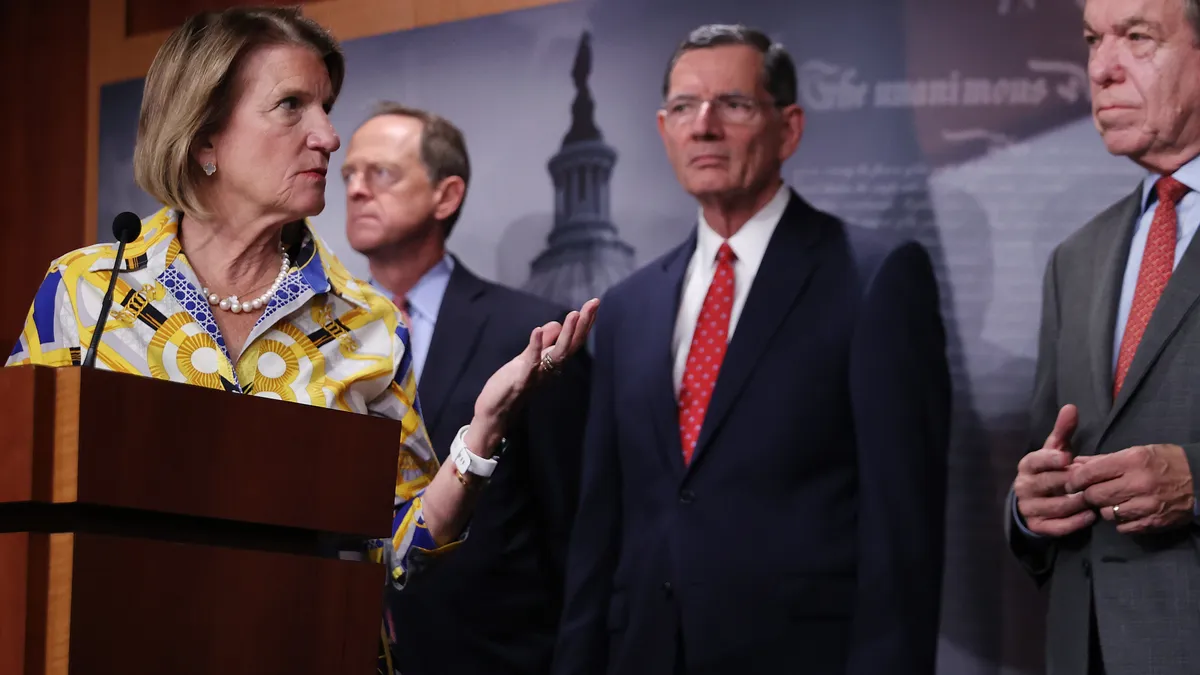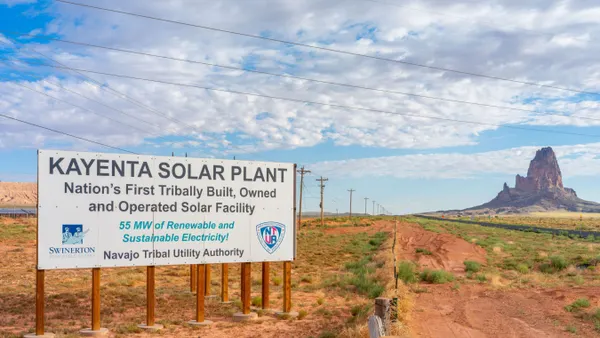Dive Brief:
-
Republican senators on Thursday unveiled their second counter-offer to President Joe Biden's proposed $2 trillion infrastructure proposal, following multiple meetings between Republican leadership and White House officials.
-
The latest proposal from the right, led by Sen. Shelley Moore Capito, R-W. Va., includes a $4 billion carve-out for electric vehicle infrastructure, under a broader $506 billion proposed investment in roads, bridges and "major projects." Biden's proposal had called for a $174 billion investment in EV infrastructure and incentives.
- In all, the Republicans proposal would spend $928 billion on infrastructure over the next eight years, a $360 billion increase over their previous proposal. "It's a serious effort to try to reach a bipartisan agreement," Capito told reporters following the release of the proposal.
Dive Insight:
The Republican plan is the latest in an effort by the party to narrow the definition of "infrastructure," according to Capito and her Republican colleagues. Senators emphasized during Thursday's press conference that infrastructure investments should stick to the more traditional definition, versus the president and Democrats' vision of using infrastructure spending to shore up U.S. investments in climate change mitigation and clean energy.
"The big question is the scope," said Capito, adding Republicans "haven't been satisfied" thus far with the White House's initial responses to their request to narrow what should be included in an infrastructure bill.
Biden's $2 trillion infrastructure proposal included billions of dollars in spending on EV infrastructure, transmission and clean energy. Specifically, the Department of Transportation has laid out plans to spend as much as $100 billion on EV incentives, $25 billion on electrifying transit vehicles, $20 billion for school bus electrification and $15 billion to install half a billion chargers across the U.S.
Biden's plan would also create a national clean electricity standard, and would include provisions around expanding the tax credits for clean energy resources.
Republican senators on Thursday said that the president seemed open to passing a series of smaller bills, versus rolling all his priorities into one major piece of legislation, and pointed to the recent passage of a water infrastructure bill and productive negotiations on a surface transportation bill as evidence that bipartisan cooperation is possible in the Senate.
Republicans also have an interest in persuading Democrats against using the budget reconciliation process for a second time this year, which would allow the party to pass spending legislation with a 51-vote margin including the vice president.
"We're hoping that this moves the ball forward," said Capito. "We believe that the alternative, which is a partisan reconciliation process, would be destructive to our future bipartisan attempts, but also doesn't serve the American public."
Another major sticking point between the two parties is how to pay for the infrastructure bill: Republicans want to use unspent funds from previous COVID-19 relief packages, in order to avoid raising taxes or inflation, while Democrats want to raise the corporate tax rate, and fear that using unspent funds will prevent pending aid from reaching businesses that haven't been able to access it yet.
Biden had originally set a Memorial Day deadline for the Senate to come to a bipartisan agreement on the plan, but negotiations will continue into June, according to the White House.
White House Press Secretary Jen Psaki said in a statement Republican's proposal includes "several constructive additions," including an effort to bring spending up to almost $1 trillion over the next eight years, something the president had specifically requested, according to Republicans.
But the White House remains "concerned" that the Republican proposal does not provide "substantial new funds for critical job-creating needs," including investment in a clean energy economy, according to Psaki.
"We are also continuing to explore other proposals that we hope will emerge," she said, adding negotiations will continue before voting resumes the week of June 7.
Right-of-center clean energy group Citizens for Responsible Energy Solutions says the plan is a sign that Republicans do recognize energy as an important component of infrastructure spending.
“EV infrastructure is very appropriate for government to tackle, especially as the EV market becomes driven more by consumer demand than tax rebates," said CRES spokesperson Ross Gillfillan. "The infrastructure is what matters here."
But EV advocates said the plan falls short of what is needed to increase the number of zero-emissions vehicles on the road in the next decade. It also "dramatically disincentivize[s] EV adoption," Daniel Zotos, spokesperson for the Zero Emission Transportation Association, said in an email. "It sends an unfortunate message to American consumers, workers, and the entire domestic EV supply chain at a time when our country is so well-positioned to lead in the advanced vehicle sector."
Clarification: After the article was published, CRES clarified its position on Republican support for EV infrastructure. We have revised the text accordingly.















